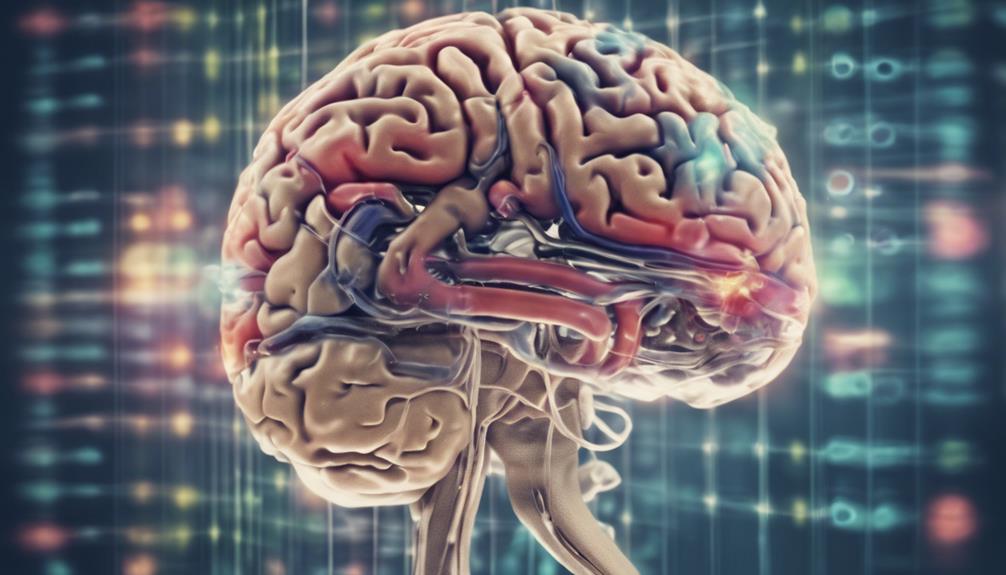The development of a narcissistic personality stems from a complex blend of genetic predispositions, parenting approaches, environmental factors, and psychological defense mechanisms. Genetic components, like specific gene variations and inheritance patterns, can shape narcissistic traits. Parenting styles, such as overprotection or neglect, have a notable impact on self-esteem and behavior. Environmental cues, societal norms, and media portrayals can reinforce narcissistic behaviors. Biological influences, including brain structure variances and hormonal imbalances, also play a role. Childhood experiences, psychological defense mechanisms, and a mix of genetic and environmental factors collectively contribute to the emergence of narcissistic traits. Further insight into these causes awaits.
Key Takeaways
- Genetic factors, like specific gene variations, play a significant role in the development of narcissistic personality.
- Parenting styles, such as overprotectiveness or neglect, can influence the formation of narcissistic traits.
- Environmental cues, societal norms, and media portrayal contribute to the expression and acceptance of narcissism.
- Childhood experiences, like overvaluation or neglect, significantly shape narcissistic traits.
- Psychological defense mechanisms, like projection and denial, can lead to the adoption of narcissistic behaviors in response to emotional pain.
Genetic Factors in NPD
Exploring the role of genetic factors in Narcissistic Personality Disorder (NPD) reveals a significant heritability of Cluster B personality disorders. Behavioral genetic studies have indicated a strong genetic component influencing both the intrapersonal and interpersonal dimensions of narcissism, shedding light on how genes contribute to the development of NPD. Research also suggests that individuals with a family history of NPD are more predisposed to exhibiting narcissistic traits, pointing towards a potential genetic link in the disorder. Specific gene variations and inheritance patterns are believed to play an important role in shaping the manifestation of NPD within individuals.
Understanding the genetic influences on NPD is essential as it allows for the identification of at-risk individuals and the customization of treatment approaches. By recognizing the genetic underpinnings of NPD, healthcare professionals can provide more targeted interventions that address the specific needs of those affected by this complex disorder. Genetic factors are a significant piece of the NPD puzzle, and their exploration is key to advancing our comprehension and management of this condition.
Role of Parenting in NPD

When it comes to the development of Narcissistic Personality Disorder (NPD), the role of parenting is vital.
The way parents interact with their children, whether through overprotective tendencies, neglect, excessive praise, or harsh judgment, can greatly impact the child's self-esteem and behavior.
Early attachment patterns and the modeling of narcissistic behavior within the family unit can shape a child's understanding of themselves and others.
Parental Influence on NPD
Parental influence plays a significant role in shaping the development of Narcissistic Personality Disorder (NPD). Overindulgent or neglectful parenting styles are key factors in fostering narcissistic traits in children. Children raised by parents who excessively praise or criticize them may be more susceptible to developing NPD traits. Additionally, the lack of consistent emotional support and boundaries during childhood can increase the likelihood of NPD traits emerging.
Parental modeling of narcissistic behaviors or attitudes can impact a child's perception of self and others, thereby influencing the development of NPD. It's essential for parents to provide a balanced environment that includes appropriate emotional support, consistent boundaries, and positive role modeling to help prevent the development of narcissistic traits in children.
Early Attachment Patterns
Moving from Parental Influence on NPD, we now direct our focus towards the impact of Early Attachment Patterns on the development of narcissistic traits in individuals.
Early attachment patterns, such as inconsistent parenting or overindulgence, play an important role in shaping a person's sense of self. Children who receive excessive praise without constructive feedback may grow up with a sense of entitlement and grandiosity. Conversely, neglectful or emotionally unavailable parenting can instill feelings of inadequacy and a constant need for external validation.
Parents who prioritize their needs over their child's emotional well-being may inadvertently encourage self-centered and manipulative behaviors. In contrast, secure attachment with caregivers who offer a balance of support and boundaries is essential in preventing the emergence of narcissistic tendencies in children.
Modeling Narcissistic Behavior
Our observations reveal how modeling narcissistic behavior within a family setting can greatly influence a child's perception of self-importance. When examining the role of parenting styles in the development of narcissistic personality, several key factors come into play:
- Parenting styles: Excessive praise and unrealistic expectations can contribute to narcissistic traits.
- Sense of entitlement: Parents promoting entitlement can instill a belief of deserving special treatment.
- Boundaries and consequences: Inconsistent boundaries and lack of consequences for inappropriate behavior can reinforce narcissistic tendencies.
- Sense of superiority: Parents who prioritize personal success over empathy can shape a child's view of superiority.
These elements highlight how vital parental influence is in shaping a child's mindset towards narcissistic behaviors.
Impact of Environmental Factors

When considering the development of a narcissistic personality, it's essential to recognize the significant influence that environmental factors, such as parenting styles, childhood maltreatment, and societal influences, can have. Studies suggest that individuals with narcissistic traits may have experienced childhood trauma, rejection, or overvaluation by parents, contributing to the development of narcissistic behaviors. Cultural upbringing plays a pivotal role in shaping narcissistic tendencies, as societal norms can impact the expression and acceptance of narcissism within a community.
Moreover, environmental cues like media portrayal and social dynamics play a role in reinforcing and perpetuating narcissistic behaviors. The way narcissism is depicted in the media and the interactions within social circles can influence the development and maintenance of these traits. Understanding how environmental factors interact with genetic predispositions is key to comprehending the complex nature of narcissistic personality traits. By examining these environmental influences, we gain insight into the multifaceted origins of narcissistic behaviors and can better address and manage them.
Biological Influences on NPD

In exploring the etiology of Narcissistic Personality Disorder (NPD), it's essential to examine the biological influences that contribute to the manifestation of narcissistic traits. When considering the development of NPD, several biological factors play a significant role:
- Brain Structure: Studies suggest that differences in brain structure, such as increased prefrontal cortex volume, may be associated with narcissistic personality traits.
- Oxidative Stress: Research indicates that oxidative stress, impacting brain function, could potentially contribute to the development of NPD.
- Hormonal Imbalances: Biological factors like hormonal imbalances, along with neurotransmitter function and genetic predispositions, are under scrutiny for their potential influence on NPD.
- Genetic Predispositions: Genetic studies propose that heritability plays a part in the emergence of narcissistic traits, suggesting a potential biological basis for NPD.
Exploring these aspects sheds light on how variations in brain regions related to empathy and self-reflection, as well as genetic and hormonal factors, may combine to influence the development of narcissistic behaviors.
Development of Narcissistic Traits

When exploring the development of narcissistic traits, it's essential to take into account the impact of childhood experiences, parental influences, and societal factors such as social media.
These influences can shape one's self-perception, interpersonal relationships, and coping mechanisms, leading to the manifestation of narcissistic traits.
Understanding the complex interplay of these factors is vital in comprehending the origins and development of narcissistic personality characteristics.
Childhood Influences on Narcissism
During childhood, various influences, such as overvaluation or neglect, can contribute significantly to the development of narcissistic traits. These early experiences play a vital role in shaping a child's personality and behavior, potentially leading to narcissistic tendencies in adulthood.
Here are some key factors that can influence the development of narcissism:
- Parenting styles: Excessive praise or unrealistic expectations can foster narcissistic behaviors.
- Emotional abuse: Early experiences of emotional abuse can contribute to the formation of narcissistic traits.
- Inconsistent parenting: Children raised with inconsistent parenting may develop narcissistic tendencies.
- Secure attachments: Lack of secure attachments in childhood can be linked to the emergence of narcissistic behaviors later in life.
Social Media Impact
Experiencing constant exposure to social media influences can contribute to the development of narcissistic traits in individuals. The culture of self-promotion, validation through likes, and comparison with others on social media platforms can fuel attention-seeking behaviors and a focus on increasing followers.
Research indicates a correlation between heavy social media use and the amplification of narcissistic tendencies, leading to self-centered actions. Individuals engaging extensively in social media activities often exhibit higher levels of narcissism, emphasizing external validation and self-image projection.
The online environment provides a fertile ground for narcissistic behaviors to flourish, with the constant pursuit of attention and validation reinforcing existing narcissistic traits. As individuals seek affirmation and recognition through likes and followers, the impact of social media on the development of narcissistic traits becomes increasingly apparent.
Psychological Defense Mechanisms
Psychological defense mechanisms play an important role in shaping the development of narcissistic traits in individuals. These mechanisms, such as projection and denial, serve as protective barriers against feelings of insecurity, inadequacy, and vulnerability.
When individuals experience emotional pain, they may unconsciously adopt narcissistic behaviors as a defense mechanism. Early life experiences, including neglect, excessive praise, or abuse, can greatly influence the formation of narcissistic traits.
The exaggeration of self-importance and entitlement commonly observed in narcissistic personalities is often a result of the persistent use of these defense mechanisms. Understanding how psychological defense mechanisms contribute to the manifestation of narcissistic traits is vital in addressing and potentially mitigating such behaviors.
Behavioral Genetics and NPD

Research findings point to a genetic component influencing both the intrapersonal and interpersonal dimensions of narcissistic personality disorder (NPD). Studies suggest that genetic factors contribute to the heritability of Cluster B personality disorders, which include NPD. While genetic predispositions play a significant role, environmental factors such as parenting styles and experiences of maltreatment also shape the development of narcissistic traits. The interplay between genetics and environment is vital in understanding how NPD manifests.
It is important to recognize that controversies exist regarding the origins of narcissism. Ongoing research focuses on unraveling the complex interaction between genetic predispositions and environmental influences in the development of NPD. By studying both genetic and environmental factors, researchers aim to gain a deeper understanding of how these components contribute to the emergence of narcissistic traits. This holistic approach sheds light on the multifaceted nature of NPD and emphasizes the importance of considering both genetic and environmental influences in its etiology.
Life-Limiting Illness and NPD

Life-limiting illness can greatly influence the manifestation of narcissistic traits and behaviors in individuals with Narcissistic Personality Disorder (NPD), exacerbating their need for control and attention. When faced with a life-threatening condition, the following factors come into play:
- Triggers: Life-limiting illness can act as a trigger for heightened narcissistic behaviors and responses.
- Vulnerability: Individuals with NPD may struggle with feelings of vulnerability and a loss of power when confronted with their mortality.
- Coping Mechanisms: Coping mechanisms related to NPD, such as denial or manipulation, may become more pronounced as they try to maintain a sense of control.
- Attention: The need for attention and admiration may intensify as the individual seeks validation and reassurance in the face of their illness.
The stress and uncertainty surrounding a life-limiting illness can challenge the narcissistic individual's sense of superiority and invincibility, leading to maladaptive responses. It's important to understand these dynamics to provide appropriate support and care for individuals with NPD facing life-limiting illnesses.
Psychological Distress and NPD

Experiencing significant distress, whether from childhood trauma or ongoing stress, can play a pivotal role in the development of Narcissistic Personality Disorder (NPD). People with NPD may use grandiosity and self-importance as coping mechanisms for underlying psychological distress. Research indicates a connection between psychological distress and the display of narcissistic traits.
High levels of distress, like feelings of inadequacy, rejection, or trauma, could fuel the excessive need for admiration and validation observed in individuals with NPD. Understanding this link is essential for devising effective treatment strategies. By addressing the root psychological distress, therapists can help individuals with NPD develop healthier ways of seeking validation and managing their emotions. Therapy focusing on building self-esteem, emotional regulation, and empathy can be beneficial.
Recognizing the impact of distress on NPD allows for tailored interventions that aim to address both the symptoms and underlying causes, leading to more positive outcomes in treatment.
Controversies in NPD Causes

Often debated among experts, the origins and development of narcissism in individuals raise significant controversies. Here are some key points worth examining:
- Genetic factors: Research suggests a heritability component in Cluster B personality disorders like NPD, indicating a potential genetic influence on the development of narcissistic traits.
- Parenting style: The way individuals are raised and the type of parental involvement they receive can impact the likelihood of developing narcissistic traits during childhood and adolescence.
- Maltreatment: Experiencing abuse or neglect during formative years can contribute to the manifestation of narcissistic behaviors as a coping mechanism or defense mechanism.
- Environmental factors: Life circumstances, such as dealing with a life-limiting illness or significant psychological distress, can also play a role in the expression of narcissistic personality disorder.
These factors interact in complex ways, highlighting the intricate nature of understanding the causes of narcissistic personality traits.
Frequently Asked Questions
What Kind of Childhood Creates a Narcissist?
When it comes to what kind of childhood creates a narcissist, experiences such as overprotection, excessive praise, rejection, judgment, and emotional abuse can play a role. Parenting styles lacking discipline, failing to address inappropriate behavior, or neglecting emotional needs may foster narcissistic tendencies.
Constant comparison, excessive criticism, and feelings of superiority over peers can also lead to the development of narcissistic traits.
How Does a Person Get Narcissistic Personality Disorder?
We acquire narcissistic personality disorder through a complex interplay of genetic predispositions and environmental influences. Factors like family history, childhood experiences, and cultural upbringing all contribute to the risk of developing NPD.
Research shows that a combination of genetic, environmental, and biological elements come together to manifest this disorder. Understanding these dynamics is essential in comprehending how individuals can develop narcissistic traits and behaviors.
What Is the Coping Mechanism of a Narcissist?
As narcissists, we often turn to coping mechanisms like seeking constant admiration, using manipulation for control, denying responsibility, projecting blame onto others, lacking empathy, and isolating ourselves to protect our self-image of perfection.
These strategies help us maintain a sense of power, avoid criticism, and shield ourselves from emotions that challenge our grandiosity.
Understanding these coping mechanisms can shed light on the complex behaviors associated with narcissistic personalities.
What Words Can Destroy a Narcissist?
When dealing with a narcissist, certain words can trigger intense reactions. Criticizing their superiority, intelligence, or achievements may provoke insecurity and defensiveness.
Pointing out flaws can lead to denial or blame-shifting. Expressing empathy may threaten their self-centered worldview.
It's important to approach conversations with tact and awareness to avoid escalating conflicts. Understanding these dynamics can help navigate interactions with narcissistic individuals more effectively.
Conclusion
To sum up, the causes of narcissistic personality are complex and multifaceted. Genetic factors, parenting styles, environmental influences, biological aspects, and life experiences all play a role in the development of narcissistic traits.
It's like a puzzle with many pieces that need to fit together just right. By understanding these factors, we can better comprehend and address the root causes of narcissistic personality disorder.










